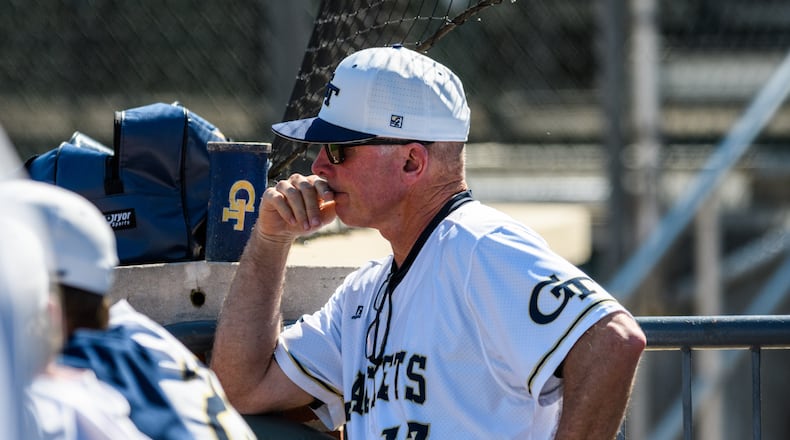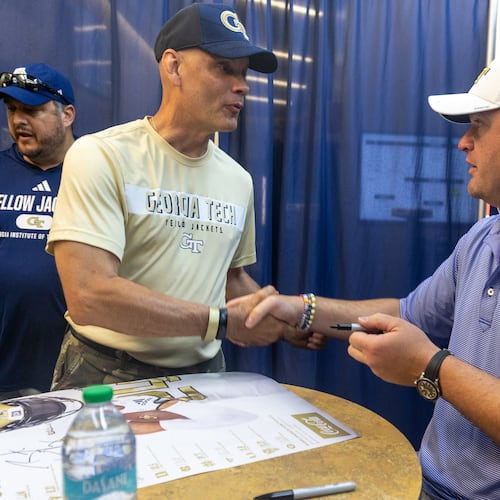In the immediate moments following Georgia Tech’s loss to Virginia on May 24 at the ACC tournament, Danny Hall knew something with his program had to change.
Hall’s Yellow Jackets had limped to a 30-27 record and would miss the postseason, an unacceptable outcome for the standard to which he holds his program.
“That’s a very bad feeling as a coach when you know that’s gonna happen,” Hall said Friday about not making an NCAA Regional in 2023. “And it’s like, ‘OK, what do we need to do to make this team competitive?’ And the answer was very simple. We have to get in the (transfer) portal.”
Hall’s team opened practice Friday at Russ Chandler Stadium, a little less than three weeks from starting the 2024 season. It’s a team that features nearly 30 newcomers, most of which are freshmen, but a dozen of whom transferred in from a different school.
The new age of college athletics, which includes the ability for athletes to transfer without sitting out a season, and to transfer to schools which may help provide payments through name, image and likeness initiatives, has shifted the way Hall now builds his roster. That includes carefully surveying the NCAA’s transfer portal.
“The portal is hard to navigate from the standpoint that there’s a lot of schools that, I would just say it like this, that have collectives that have a lot of money, and those collectives want those teams to get this best players in the country. And the ones that have the collectives up and running and have a lot of money, they can get the best players, just quite honestly,” Hall said. “We are not at that level. So in knowing that, as far as collectives and everything, we probably gotta be the Tampa Bay Rays. We gotta make some great evaluations, and we need to get the guys that are the right fit for Georgia Tech, which is a big piece of the puzzle.”
Going into his 31st season at Tech, and 36th as a college baseball coach, Hall has led the Jackets to an NCAA Regional 23 times and to the College World Series three times. But his team hasn’t advanced to a Super Regional since 2006.
Whether this year’s squad is the one to snap that streak remains to be seen. Hall is hopeful that signing players such as catcher Matthew Ellis from Indiana, infielders Mike Becchetti (Fairfield) and Peyton Green (North Carolina State) and former Georgia State pitcher Cam Jones helps get Tech over the hump.
Hall added he and his staff were selective, too, about who to sign for the 2024 season. The players not only had to fit what Hall was looking for from a culture standpoint but had to be able to handle the academic rigors of the institute as well.
And balancing the number of transfers to bring is a moving math problem when coupled with how many of Hall’s high school recruits decide to sign professional contracts, how many players off the previous season’s team go pro and who all graduates from, or transfers out of, Tech in the offseason.
Signing transfers, however, can plug holes sooner than later.
“We have always prided ourselves on recruiting at a high level with freshmen, getting them in here, developing them, putting them in the first to play. But that is not a good formula, just honestly, these days because, I mean, there’s guys that are 23, 24, maybe 25 years old playing college baseball. So to expect an 18-, 19-year-old kid to have the experience and the competitive fire that someone that has played three or four seasons in college baseball is just not gonna be a good recipe.
“It’s a different recruiting model, and it’s something that we will continue to do. Now will we bring 12 players in like we did this year? Probably not. But when we feel like there’s an area that we need to improve upon, the easiest way, not necessarily a quick fix, but try to fix something would be to go into the transfer portal.”
Tech is scheduled to open its season Feb. 16 when it hosts Radford for a three-game series.
About the Author
Keep Reading
The Latest
Featured



